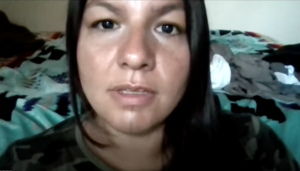Youth poised to become regional climate leaders come together virtually

By Rick Garrick
THUNDER BAY — Serpent River’s Candace Day Neveau highlighted the Indigenous commercial fishing legacy during the Climate Justice Across the Lake Superior Watershed virtual panel webinar at Lake Superior Living Labs Network’s Climate Action Field School. The field school brought together a diverse group of young people poised to become regional climate leaders at four locations around the Lake Superior watershed, including Thunder Bay, Sault Ste. Marie, Houghton, Michigan and Duluth, Minnesota, from Aug. 21-27.
“I honour my grandfather in my work — he’s a commercial fisherman on Lake Superior and it’s a responsibility and custom our family had for generations — and why that’s important is because my son now is stepping into that legacy,” says Day Neveau, co-founder of the Baawaating Water Protectors, during her Aug. 25 presentation. “Our fishermen are very important and that’s one thing I wanted to bring up was the importance of that knowledge base. They’re seeing the directions of the winds — you have to be able to understand the winds in order to be on the lake — it’s ancient Anishinabe knowledge that’s been passed down from generation to generation.”
Day Neveau adds that her grandfather was a fishing sovereigntist.
“I go into this work with optimism but also direction from my ancestors as how to lead this difficult narrative of correcting and restoring what we call now justice,” Day Neveau says. “For me, it’s really centring land back, the movement and being able to support the Indigenous land defenders that are going to jail for protecting land.”
The virtual panel webinar also featured a keynote on Fairy Tales, Legends and Climate Justice by Chúk Odenigbo, a founding director with Future Ancestors Services, and presentations by Shelby Gagnon, an Aroland citizen with the Indigenous Food Circle, and Shadiya Aidid, with Fossil Free Lakehead.
“It’s important to be able to learn from traditional knowledge,” Odenigbo says. “Because the Lake Superior Living Labs Network is very science-based — it’s a lot of scientists collaborating together — I wanted to highlight the importance of multiple forms of knowledge creation to fully respect the Indigenous people but also to fully respect [that] we are a multicultural country and everyone has such interesting, unique and different backgrounds and perspectives and cultures — we have to learn from the stories these cultures shared.”
Betty Carpick, an interdisciplinary artist whose mother was from South Indian Lake in Manitoba, delivered a natural inks and dyes workshop on the last day of the field school.
“We used the inks to connect both to the land and our understanding of the land and thinking about water,” Carpick says. “My role was to use art to provide an invitation to listening and caring for the natural world. I made inks with harebell, tansy, goldenrod and blueberry — the blueberry came from last year because of the drought, so that was part of the conversation. The youth did make an ink with carbonized willow sticks and they all brought water from places that were meaningful to them. We ground up the willow sticks and they added bits of their own water and we made a collective [black] ink.”
Charles Levkoe, Canada Research Chair in Equitable and Sustainable Food Systems at Lakehead University and one of the organizers of the field school, says it featured local events at each of the four locations throughout the week and virtual events, including a circle tour welcome event to start the week.
“We had Elders and Knowledge Keepers in each of the communities kind of just ground us and talk about where we are and talk about some of our responsibilities to the land and the watershed,” Levkoe says. “On Sunday we had a panel discussion on What is Climate Action.”
Information about the Lake Superior Living Labs Network is posted at: livinglabs.lakeheadu.ca.


